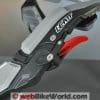The Leatt STX Road Brace is designed for street use.
Worn over clothing, it helps prevent rider neck injuries.
OK, so it may look a bit strange and perhaps even complicated.
But it’s surprisingly easy to wear, requires no maintenance and it’s nearly unnoticeable to the rider.
The new Leatt STX Road Brace was introduced at the 2011 Powersports Dealer Expo (report) in Indianapolis, Indiana.
I covered the intro at the show and wrote this introduction to the Leatt STX Brace, which includes a brief video presentation that is also included below.
The STX isn’t the first Leatt product reviewed on webBikeWorld; the Leatt GPX Club Brace (review)was featured in a 2009 review by Derryn Wong.
And just about everything that was said about that version goes for the STX Road brace also.
All of the Leatt Brace iterations are named for the company founder, Dr. Chris Leatt, a South African who was inspired by the death of a fellow motorcycle rider to invent the product.
Development started in 2001 and the first commercial product went on sale in 2006 and the company has grown ever since.
The Leatt Corporation now offers several versions of the neck brace for street riding, off-road adventures, ATV use, karting and even bicycling.
The company has also recently added a line of body armor and clothing to the mix and you’ll find a couple of photos of the Leatt Pro Jacket in my 2011 Dealer Expo report.
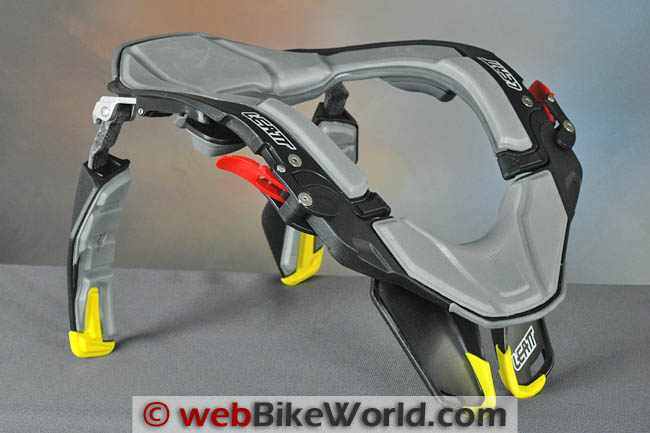
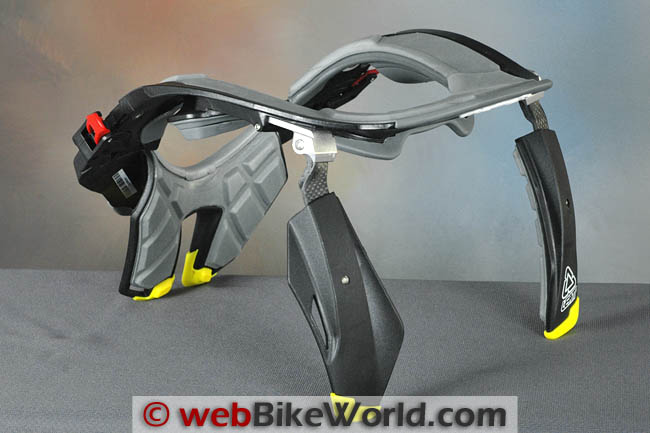
Introduction
“All the gear, all the time” goes the saying you’ll hear at just about any motorcycle training class. While it sounds good in theory, honestly, do you really wear all the gear all the time?
If you do, well, kudos and salutations — you get the “Brass Filigree With Bronze Oak Leaf Clusters” as the late, great Jean Shepherd used to quip.
If you are a serious “all the gear, all the time” 100-percenter, then it means you’re wearing — starting from the bottom and moving up — motorcycle-specific boots, gloves, pants and a jacket.
And a helmet (of course).
On the inside, you’re fully outfitted in CE Level 1 or 2 armor. And you’re wearing a back protector…right?
Now here this: there’s one more piece of gear to add — the Leatt Brace.
The STX Road brace is specifically designed for street use, although there isn’t all that much difference between the STX and other Leatt Brace flavors other than some tweaks to make each one work better for its specific type of powersports activity.
Oh, and by the way — you’re also wearing highly visible clothing and you check your tire pressures before each ride, correct?
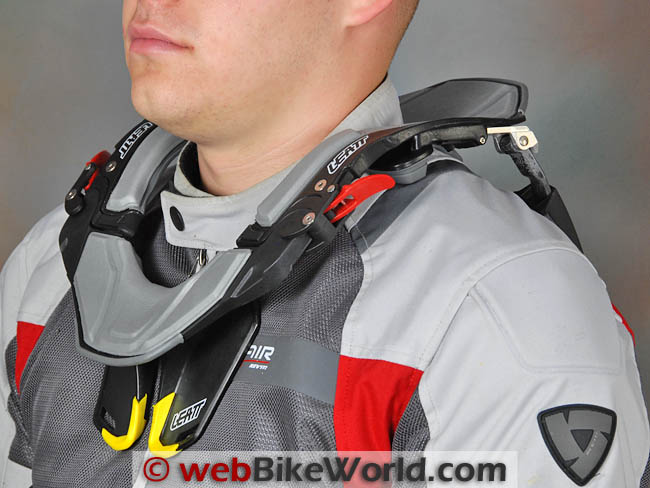
What Is It?
I’m going to assume that many people reading this review will balk at even the thought of wearing “all the gear”, much less “all the time”.
For example, I’ll be the first to admit I rarely wear a back protector — although I definitely always wear proper boots, pants, jacket, gloves and a helmet on every ride.
The problem is that I just haven’t found a back protector that’s comfortable.
Let me take a little sidebar here…
I’m surprised that high quality back protectors aren’t included in more motorcycle riding jackets — even some very expensive jackets — because surely that would be the best way to get motorcyclists to wear one.
Strapping on an accessory back protector for a ride down to the deli is problematic, so including one in a jacket is the way to go for the, ummm, 98% of us who don’t wear 100% of that gear 100% of the time.
So now this is where a touch of irony creeps in. The Leatt STX Brace (or any other Leatt Brace for that matter) looks like a complicated piece of kit that would be a pain in the…neck…to wear.
But it’s not at all — and there’s the irony. Even though it may look like something out of the “Alien” movie (the first and original — not the junky follow-ons thank you), it’s surprisingly easy to use.
I have never worn a neck brace of any kind until the STX arrived a few weeks ago, so I didn’t know what to expect.
But having already confessed at not being a true 100-percenter, I wasn’t really looking forward to wearing it either. At first glance, you’d think even a back protector would be more comfortable.
But honestly, once you get the thing adjusted, which in my case took less than 30 seconds, wearing it is a snap — literally — and it’s been as unobtrusive as a reflective stripe in my normal street riding routine.
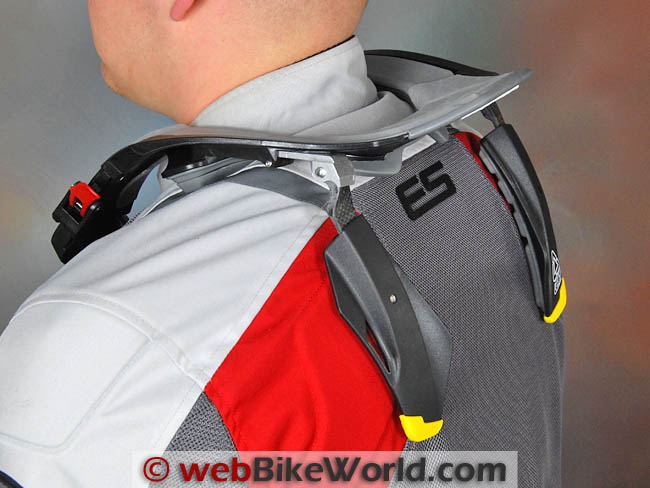
How Does It Work?
The purpose of this strange-looking device is similar to the HANS (Head And Neck Support) device used in motor racing and boat racing.
Derryn did a masterful job at describing the Leatt GPX Club Brace (review) in his review, so I won’t go into all the details but I’ll crib some of his text here just to give you the basics.
The Leatt Brace is designed to prevent neck and spinal injuries. The basic idea of the Leatt Brace is “to bring the head to a controlled stop”, according to the company.
“Helmet impacts otherwise transmitted from the helmet to skull and then to the neck are re-directed from the helmet to the brace to other body structures in a safe way”, according to Leatt.
The Leatt Brace is designed to prevent a range of injuries, none of which sound like something you want. These include:
- Hyperflexion and Hyperextension: Extreme forward, backward and sideways movements of the head.
- Axial Loading: Compression of the spine.
- Posterior Hypertranslation: Extreme rearward movement of the neck and helmet.
How does it do all that? It’s pretty simple actually. It sits on your shoulders and it works with the motorcycle helmet to prevent the head from moving too far side to side or back and forth. That’s it!
Note that a Leatt Brace (and the HANS device) only works when paired with a helmet.
This may or may not sound obvious, but when I first saw it, I couldn’t figure out how it worked. It’s quite simple really — the brace only allows the bottom part of the helmet to turn so far and that’s it.
The best illustration of this is in the following series of photos we took.
The first row shows the amount of head movement without the brace, and the second row shows how far the helmet can move when the rider is wearing the brace:
NOTE: In the first row of photos above, the rider is only turning his head as far as it remains comfortable.
Neck Impacts
In an accident, gravity and force could twist the head into a much more severe angle, obviously…even to the extreme, which can cause a fatality.
But in the second row of photos, you’re seeing about the maximum distance the head can travel. The forces are transferred down on to the Leatt STX Brace and then on to the rider.
The brace is specially designed with a cutout over the collarbone and a “crumple zone” in the rear, along with padding in the top and bottom to help absorb the energy transferred during the impact.
This is the same concept as the EPS liner in a helmet and the helmet shell.
Besides the safety features built into the Leatt brace, the STX Brace has a few comfort-related features as well. For example, notice the “slot” like cutout in the front of the brace?
It provides access the jacket zipper at neck level. The scapula braces in the rear are also located far enough apart to account for leather one-piece suit speed humps and back armor.
Also, the Leatt STX Brace has a lower profile and it can be folded up (sort of) and stowed in a (large) tank bag or saddlebag. It even fits in the petite Happy Trails Imnaha panniers (review)!
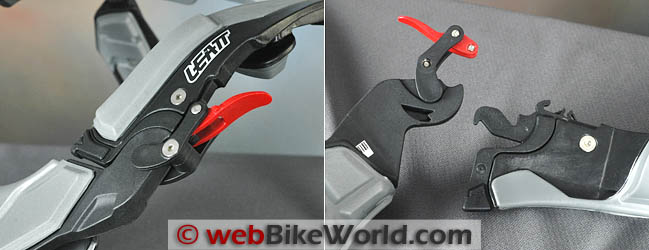
The Leatt STX Road Brace Details
The size large STX brace shown here weighs 772 grams (1.7 lbs.).
When it’s on the shoulders, the weight feels evenly distributed and since you can’t see it when you’re wearing a helmet, it pretty much disappears from the consciousness.
The brace gets its alien-like looks in part from the construction; it is made from a conglomeration of high-tech stuff like Kevlar, carbon fiber, fiberglass and something called “Biofoam”.
It’s completely waterproof, by the way — there’s nothing on it that could absorb water anyway. It even smells high-tech — the plastic gives off a sort of new car smell that lasts a few days when the brace is new.
All of the pieces seem to be made with high precision and quality. The STX brace comes in three different sizes, depending upon your chest diameter.
The size large fits a roughly 34″ to 43″ chest circumference (90-110 cm), while the small size fits a 21.5″ to 35″ chest (55-85 cm) and the XL fits a 44″ to 48″ chest (111-121 cm).
There are some height constraints also, so be sure to check the Leatt sizing charts first. Also remember that there are several other Leatt Brace designs and they even come in different colors and team graphics.
Fitting the Leatt STX Road Brace
The main parts of the brace are the front chest section and the rear “scapula wings” that rest on the back.
The brace opens up on either side and it’s only necessary to open it up on one side to put it on (demonstrated in the video below).
Each side of the brace opens with the red levers you can see in the photos; they cam into a hook to lock the brace closed.
Leatt says the levers are colored red to indicate to emergency personnel that the levers can be opened to remove the brace.
The STX Brace is worn over the jacket and it simply sits on your shoulders; there is no need to secure it, although Leatt provides a webbed strap to do so if you wish.
The STX brace is set to the medium neutral position when it is sold. The front-to-back distance can be adjusted by opening a lever and moving the scapula wings to one of three positions.
The “hole” that your head fits into can be adjusted front-to-back by removing and adding a different locating “pin”, or locking mechanism on the side.
This is the same system used in the Leatt GPX Club Brace (review), so it should be familiar to the many thousands of Leatt Brace-wearing motocross riders.
The STX brace comes with the medium pins installed and short, long and extra long pins are included in the box.
They are removed and replaced with a provided Allen wrench and this only needs to be done once for the rider, if at all.
We found the medium stock setting to work on four different riders of different sizes with no adjustment necessary other than moving the scapula wings in or out depending on the type of jacket worn.
Once you’ve figured out which of the three sizes to buy, putting it on is a pretty straightforward procedure.
Basically, it just has to sit comfortably on the shoulders. Pick up up off the shoulders and drop it and it should center itself correctly.
There is a certain amount of tolerance in the fitment — a fairly wide range, actually.
The scapula wing angle can also be adjusted, but apparently this is rarely needed and we found that no adjustment to the angle was necessary.
As I mentioned earlier, all we did was move the scapula wings out one notch to the middle choice and we were all set. This took less than 30 seconds; flip up the lever, move the wing, close the lever.
I usually put on the STX brace before the helmet because it’s easier to see the side clamp. After the first couple of tries, I found I could do it without looking.
Riding With the Leatt STX Brace
The STX Brace is designed for street use, so it has a lower profile and less bulk than the motocross and other versions. I haven’t tried any of the other designs, so I don’t know how they might compare.
But despite its looks — and if it’s sized and adjusted correctly — the Leatt STX Brace pretty much goes unnoticed when riding.
In fact, that’s the biggest surprise to me and, I’d guess, one of the biggest humps that Leatt probably has to face with motorcyclists who are unfamiliar with the product.
Maybe it’s me, but from looking at the thing, I just figured it would be a constraining nightmare to wear, and I was completely wrong.
The only time I do notice it is if I turn my head too far forward, but if the brace is properly adjusted, you’d have to dip farther than you would normally to feel it.
If I’m deliberate about it, I can turn my head side to side, front to back and feel the brace immediately stop the helmet, and that’s exactly how it should work.
It’s strange perhaps at first, but it’s actually a pretty good feeling knowing that my head will stay screwed on correctly if I fall.
The thin profile of the STX Brace and the different profile in the front are designed with the street and track rider in mind, understanding that road motorcycles will have a much wider variety of rider positions than a motocross bike.
Two of us have worn the brace on a variety of street bikes including touring bikes, the Suzuki DR650 (blog), the Multistrada 620 (blog) and Burn’s old Suzuki TL sportbike.
There’s not much to report — put it on, ride. I’m not about to crash test the thing, so I can’t tell you about that!
Pricing
The Leatt STX Brace is rather expensive at $395.00 list. I suppose one could say “What price safety?”, but 400 bucks is a lot of dosh, there’s no way around it.
However, if you’re a serious street or track day rider or a stunter, I’m sure you’ll be interested in the potential for protection that the STX Brace offers.
Conclusion
I’ll be the first to admit that it will take some time before the majority of street riders will adopt a Leatt Brace.
But the same thing could have been said about full-face helmets, motorcycle-specific boots and gloves and even jackets (and pants).
Not to mention high-visibility colors, which I’d like to think we’ve been promoting here on webBikeWorld for more than 11 years and which only now have become popular.
The main take-away from my experience with this product is that it wears much more gently than it looks. To me, that was the biggest surprise. I can put it on and really don’t notice it’s there, and that’s a good thing.
Perhaps someday a Leatt Brace type device will be incorporated in every motorcycle jacket — along with the “perfect” back protector.
Until then, know that the STX street version of the Leatt Brace is wearable and fairly comfortable, if expensive and perhaps a bit odd-looking.
I will leave you with this:
As you find yourself sailing through the air in the slow motion time that usually happens milliseconds before impact, let’s hope you’re not thinking “I should have bought a Leatt Brace”.
Let’s hope you’re actually wearing one — and 100% of all that other gear!
More webBikeWorld:
| wBW Review: Leatt STX Brace | |
|---|---|
| Available From: Leatt Brace | List Price: $395.00 |
| Colors: Black | Made In: Unknown |
| Sizes: S/M, L/XL, XXL. | Review Date: July 2011 |
|
Note: Item was provided by a retailer, distributor or manufacturer with these Terms and Conditions.
|
|
Owner Comments and Feedback
See details on submitting comments.
From “B.M.” (July 2011): “ATGATT. All the Gear, All the Time. That’s pretty much me.
Boots, overpants (mesh most of the year, but with hip and knee armor), mesh jacket with armor in the elbows, shoulders and a CE back protector in the jacket. Held gloves and a high quality helmet.
About the most I give is that I may ride without the pants if I’m just going a couple of blocks to lunch. But the neck protector? I don’t know.
Given that I already have 3 fused cervical vertebrae, it’s probably not a bad idea. But $400 is a lot.
In all honesty, though, I’m less worried about the money than the hassle of one more piece of gear to put on, take off, find a place for when going into a restaurant (or work).
As you say, if it went on and off with the jacket, like by back protector, it would be a no brainer. Just how common are neck injuries, anyway?”
From “B.E.” (July 2011): “How peculiar that you ran a story about the Leatt STX neck brace not 3 weeks since I crashed my bike at a local track day and broke my C2 vertebrae in the accident.
This is referred to as a Hangman’s Fracture, and is normally caused by sever hyperextension of the neck.
After hitting the pavement I blacked out and tumbled at least twice, which is likely when the break occurred. Luckily I have no nerve damage and will recover by wearing am immobilizing cervical thoracic orthotic brace for 3 months.
Picture a neck brace from the stomach up and you’ve got it. Thankfully it’s not the full on freak show halo.
Whew! I’ve always been an ATGATT guy, except for a full on back protector.
I had on a back protector and full racing leathers, plus the usual CE rated boots, Teknic racing gauntlets and a very good Shark RSX helmet at the time, yet still suffered the neck fracture along with heavy bruising
Luckily nothing else was severely hurt, which is a testament to the quality of my gear, much of which was bought after consulting numerous reviews, including here at webBikeWorld.
So in that way I owe you a big thanks for the work you do reviewing these products for us!
Prior to the accident I would have never considered such a device for normal daily use.
But after accumulating over $35,000 in medical expenses (thank goodness I have insurance!) along with the pain of the injury and the discomfort of 3 months of orthotics wear during my recovery, a $400 neck brace sounds cheap and easy.
I’m not trying to scare anyone into buying one, but that brace would almost certainly have prevented my injury. Consider at least one sold Leatt, and thanks for making the product available to those of us who value our safety.”










